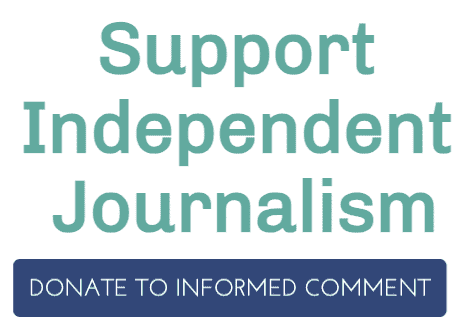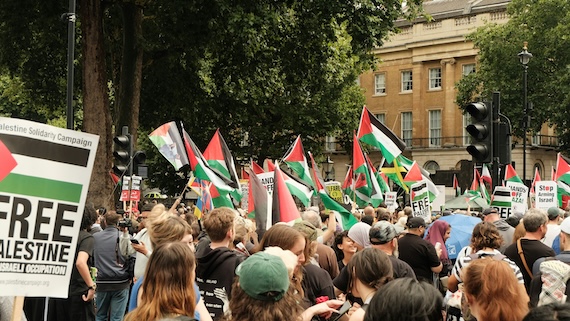By Mehmet Rakipoğlu and İbrahim Özcoşar | –
Exeter, UK and Mardin, Türkiye (Special to Informed Comment; Feature) – In the aftermath of 7 October 2023 – when Hamas’s surprise “Al-Aqsa Flood” attack and Israel’s devastating genocidal war on Gaza shook global politics – Western academia has entered its own crisis. From the United States to Europe, professors and students who criticise Israel or show solidarity with Palestinians have been smeared, silenced, and even suspended. Administrators, under pressure from wealthy donors, lobby groups, and governments, increasingly act as enforcers of a hegemonic narrative that allows no dissent.
What we are witnessing is a new wave of McCarthyism on campus: a systematic attempt to police speech and thought. As Antonio Gramsci would recognise, this is cultural hegemony in action – the ruling bloc’s effort to enforce intellectual orthodoxy and make pro-Israel sentiment appear as “common sense.”
Yet this repression has sparked a backlash. We need a form of epistemological resistance – an intellectual uprising to challenge the knowledge system that disregards the humanity of Palestinians. This epistemic resistance would seek to dismantle entrenched narratives in universities, journals and public discourse.
Silencing dissent
The suppression of pro-Palestinian voices is not new, but it has intensified dramatically since October 2023. A notorious example is Canary Mission, an anonymously run website that blacklists students and professors deemed “anti-Israel.” It compiles online dossiers falsely branding activists as antisemitic or sympathetic to terrorism. Far from harmless trolling, these lists have been used by Israeli authorities and even U.S. immigration to interrogate, deny entry, or deport individuals.

Or by check:
Juan Cole
P. O. Box 4218,
Ann Arbor, MI 48104-2548
USA
(Remember, make the checks out to “Juan Cole” or they can’t be cashed)
Western universities have also capitulated to political pressure. At Columbia University, Palestinian American professor Joseph Massad was vilified for contextualising Hamas’s attack, while a Cornell professor was suspended for remarks perceived as sympathetic to Palestinian resistance. The chilling message to faculty is clear: fall in line or face punishment. A recent survey found that 81% of U.S.-based Middle East studies scholars now feel compelled to self-censor their criticism of Israel, with 72% saying this pressure spiked after October 7.
Students have faced even harsher clampdowns. In spring 2024, Columbia students staged a sit-in demanding divestment from companies aiding Israel’s war on Gaza. The response was draconian: dozens were arrested by police, the campus was shut down for days, and administrators imposed mass suspensions. Across the U.S., over 3,100 students were arrested in the largest campus mobilizations since Vietnam – often punished with expulsions and bans on student groups.
In the UK, the climate has been similarly repressive. Universities cancelled Palestine-related events, restricted student societies, and even reported their own students to the police over social media posts. An open letter by BRISMES documented widespread censorship, while in Germany, authorities banned rallies and shut down a Palestine literature event in Berlin. Philosopher Slavoj Žižek lambasted the double standard, warning that suppressing moral outrage at genocide risks fuelling the very antisemitism it claims to fight.
Perhaps the most striking symbol of this repression was the viral image of German police dragging away a Jewish peace activist at that event for the “crime” of protesting Israel’s actions in Gaza. The irony could not have been clearer.
Knowledge and power
Why this sweeping repression? At its core, it is a struggle over who controls knowledge and narrative. Edward Said famously observed that “Palestinians have been denied permission to narrate their own history.” Western media and academia privileged the Israeli perspective for decades, rendering Palestinian voices marginal or illegitimate. Today’s gagging of pro-Palestinian scholars is a stark continuation of this pattern.
Facts never speak for themselves; they require a narrative framework. By choking off Palestinian perspectives – or demonising them as hate speech – the gatekeepers of academia preserve a “socially acceptable narrative” that largely exonerates Israel. As Michel Foucault argued, power produces knowledge. The suppression of panels, the policing of terminology (such as conflating anti-Zionism with antisemitism through the IHRA definition), and the blacklisting of scholars are all ways of governing reality itself.
Never miss an issue of Informed Comment: Click here to subscribe to our email newsletter! Social media will pretend to let you subscribe but then use algorithms to suppress the postings and show you their ads instead. And please, if you see an essay you like, paste it into an email and share with friends.
Universities, ostensibly neutral forums for debate, have revealed their complicity. At Columbia, administrators acted more like corporate managers protecting elite donors than stewards of free inquiry. This betrayal of academic freedom undermines not only Palestinians but the very mission of the university as a “critical institution.” As Jürgen Habermas argued, the public sphere requires open debate; without it, democracy itself suffers. Unfortunately, even Habermas has not lived up to his own ideals.
Epistemological Resistance
Despite the repression, resistance is building. The silencing of Palestinian perspectives has provoked a counter-movement determined to reclaim the narrative.
Signs of this intellectual uprising are multiplying. In 2023, dissident academics launched the Institute for the Critical Study of Zionism to create space for research on Zionism’s colonial and racial dimensions. Student movements like Students for Justice in Palestine and Jewish Voice for Peace have grown in strength, organising teach-ins, “die-in” protests, and coalition actions across campuses. Jewish academics and students, too, have rejected the idea that Israel speaks for them, insisting that conflating criticism of Israel with antisemitism endangers rather than protects Jewish communities.

File photo of London Demonstration July 24, 2025, by Harrisun S on Unsplash
History suggests such repression cannot last. During the civil rights and Vietnam War era, universities also tried to clamp down on dissent – yet those students helped reshape public opinion. Figures once blacklisted, like Norman Finkelstein, continued their work and today find their critiques of Israel validated by mainstream human rights organisations. Edward Said, vilified in his time, is now canonical for understanding imperial narratives. The truth, as history shows, eventually breaks through.
Why it matters
Israel’s war on Gaza has provoked outrage across the world, but universities – which should be at the forefront of difficult debates on genocide, colonialism and resistance – have often chosen silence or complicity. Each act of censorship undermines the integrity of scholarship and corrodes democratic values.
At the same time, the heavy-handed repression has sparked a moral awakening. Students and faculty are building new alliances, creating independent platforms, and refusing to be silenced. They are, in effect, constructing a new epistemic common beyond the ivory tower.
This is the paradox of the current moment: Zionist repression in academia has never been more brazen, yet it has also never provoked such determined resistance. The “Epistemological Resistance” is not just a metaphor – it is an unfolding reality, a wave of critical scholarship and peaceful activism challenging entrenched power.
As Edward Said urged, Palestinians must have the permission to narrate their reality – and scholars must have the freedom to teach it. Anything less makes a mockery of the academy. The fight for a free mind is inseparable from the fight for a free people. If the walls of censorship begin to crumble on campus, it may hasten the fall of walls of oppression beyond.
After all, every revolution begins with a shift in consciousness. And today, on campuses from New York to London, that intellectual resistance has already begun.


 © 2026 All Rights Reserved
© 2026 All Rights Reserved